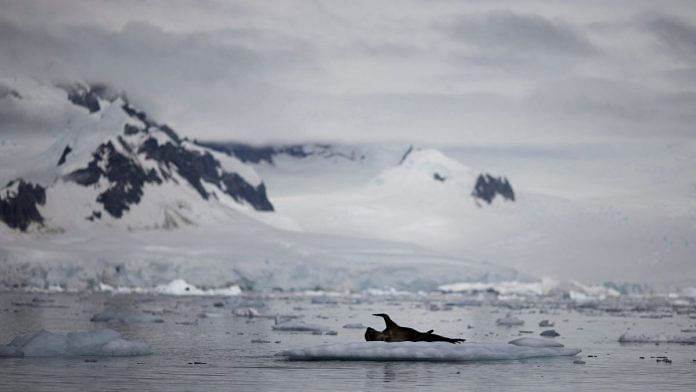New Delhi: The past month has seen extreme weather events around the world, including reports calling July the ‘hottest month’ on record.
Now, scientists have produced new research looking specifically at Antarctica – one of the coldest places on Earth – suggesting they are “virtually certain” of the increased occurrence of extreme weather events in the polar region.
With the World Meteorological Organisation predicting a breach of the 1.5 ℃ global heating limit set by the Paris Agreement in the next 5 years, the study cautioned against increased emissions.
The Antarctic is a region that has already undergone significant changes this year, including the extreme loss of sea ice. While Antarctic ice melts during the summer months in February, it is expected to freeze back up during winter, reaching peak cold temperatures in September. However, according to reports, the melted sea ice this year in Antarctica is equivalent to the size of Greenland, and it has been very slow in freezing back up. Based on historical records, there should be 16.4 million square km of ice by now, but we only see 14.1 million square km this year.
Led by Martin Siegart at the University of Exeter, scientists have published a paper titled “Antarctic Extreme Events” in Frontiers in Environmental Science. The study looks at the different realms of Antarctic ecosystems and their records of extreme events.
Antarctic atmosphere, sea ice, ocean temperatures, land ice, and marine biodiversity are some of the spheres they analyzed for evidence of the extreme events in the region. This evidence was then used to create models to make future projections of changes in the Antarctic climate due to human-related factors.
The study modeled that Marine Heat Waves, i.e. extreme heating up of the ocean, have occurred 19 times over the past 20 years in Antarctica. This causes melting of the sea ice, as well as changes in acidity and chlorophyll levels in the oceans. Due to rapid sea ice melting, Antarctica now contributes six times as much to rising sea levels in the world than it did 30 years ago.
The study does not claim all changes in the Antarctic atmosphere are due to fossil fuel burning or other climate change-related factors. The extreme heatwave in Antarctica in March 2022, which was 38.5 ℃ above the mean, was due to an “atmospheric river” that brought moisture-filled air from the tropics to the polar regions.
However, events like the thinning of land-ice sheets, rapid reduction of sea-ice levels, and near extinction of marine mammals, like fur seals and whales, have been directly attributed to human activities. Greenhouse gas emissions, exploitation of marine resources, extreme global warming, and rising sea levels have been flagged by scientists as the major drivers of extreme events in Antarctica.
“Antarctic change has global implications,” said lead author Professor Martin Siegert in a press release.
The study is also important because it shows the fragile ecosystem of Antarctica, and how changes in the ecology are usually in the form of “cascades”. “Warming temperatures due to the 2022 atmospheric river also led to surface warming of land ice, break up of sea ice, and the collapse of the Conger ice shelf,” the study said.
“There are deep interconnections between extreme events in different aspects of the Antarctic physical and biological system, almost all of them vulnerable to human influence in some way,” Dr Caroline Holmes, a sea-ice expert at the British Antarctic Survey, said in the press release.
The study then called for stronger environmental protection by nations that are signatories to the Antarctic Treaty, which includes India.
“Nations must understand that by continuing to explore, extract, and burn fossil fuels anywhere in the world, the environment of Antarctica will become ever more affected in ways inconsistent with their pledge,” reiterated Siegart in the statement.
Also read:



